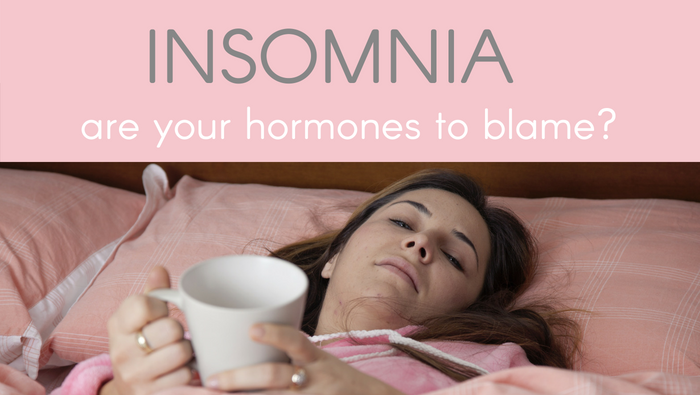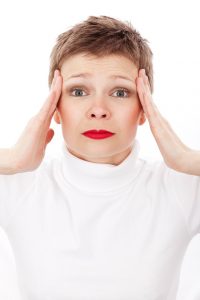Can’t sleep?
What would you do for a good night’s sleep?
Counted millions of sheep and still can’t nod off? Wakeful and weary? The alarm goes off and you want to hurl it through the window to hide under the duvet?
You’ve blamed sleepless nights on the stress of life, busy brain, last night’s sirloin steak and Shiraz, it’s too hot/cold/light …delete as appropriate.
You’ve even become resigned to your insomnia.
Have you ever stopped to think that it could be hormones? Don’t face-palm and think there’s no hope left for The Land of Nod.
Haywire hormones can be the result of insomnia, as well as the cause of insomnia. No really, still no need to face-palm. There are some simple steps you can take to help get some restful sleep.
5 Ways Hormones Can Cause Insomnia
#1 Light and Melatonin
As the sun sets, the pineal gland in your brain starts to release the sleep hormone, Melatonin. It needs darkness to work. That means natural and artificial light affects it’s release. Result? It could mean another no-kip night for you.
#2 Adrenal Fatigue
Those little glands above your kidneys are responsible for blood sugar levels and sexual development BUT are best known for producing adrenaline and cortisol, the STRESS hormones. Eek.
When your poor old adrenals are under constant pressure from life stress, they can become overworked and tired. You might have heard it called “adrenal fatigue”? One of the many symptoms is insomnia.
Adrenal over-drive isn’t so common. It’s when your adrenals pump out cortisol at a constant level all day – result? Insomnia. Usually adrenals release less cortisol as the day goes on.
#3 Premenstrual Insomnia
Premenstrual insomnia is linked with a drop in the hormone progesterone just before your period. It’s a sedative hormone.
If the drop is gradual, your sleep might be a troubled. If it drops dramatically, you’ll be wide awake at 3am staring at the ceiling.
#4 Perimenopause
Perimenopause usually starts around age 40 but can be later. Your ovaries start slowing down production of oestrogen and progesterone, and both promote sleep. Whoopy do. And so falling asleep can seem like the impossible dream …pardon the pun.
#5 Menopause
Menopause naturally occurs between 40 and 55 usually. Haywire oestrogen and progesterone levels can start waking you up at night. AND you can also get nasty night sweats that keep you awake. Double whammy.
And if you thought things must get better post menopause, think again. Some suffer low thyroid function after menopause. Low thyroid leads to weight gain. Weight gain can lead to snoring and disrupted breathing in sleep called “sleep apnea”.
So now you’re wondering, what the heck can I do to get some sleep with haywire hormones? Here’s my 8 top tips.
8 Tips for Better Sleep and Hormonal Harmony
1. Switch off all your gadgets and geekery AT LEAST one hour before bedtime. The lights from your TV, computer, tablet and smart phone affect melatonin production.
2. Make your bedroom an oasis of calm – dark curtains or blinds to block out light, not too hot or cold, natural fibre bed linen, de-cluttered and inviting. Wear light, natural fibre sleep wear.
3. Create a healthy bedtime routine – they’re not just for kids! Perhaps include a warm bath with relaxing essential oils like Lavender and Chamomile?
4. Choose sleep inducing foods in the evening. Don’t put pressure on your digestive system with heavy or rich foods too near bedtime.
Include sleep-promoting foods in your bedtime routine. Foods with the sleep-promoting amino acid Tryptophan can help sleep. Carbs make Tryptophan more available to the brain which is why you want to nod off at work after you’ve snarfed a big, old sandwich and crisps or a pasta salad.
A good snack would contain good quality i.e unrefined carbs and protein e.g. an oat cake with almond nut butter. Tryptophan rich foods include chia seeds, turkey, sunflower seeds.
5. Avoid caffeine and alcohol. Caffeine makes you wired not tired, Alcohol is a sleep thief not a sedative. Chucking back Chardonnay might help you relax, but it interferes with sleep patterns.
A better night-time drink would be my Chamomile Milk
6. Eat a hormone-helping diet – basically plenty of plant-based foods, high fibre, good fats, high quality protein, unprocessed and “clean”. Don’t leave it until the M word (Menopause) hits; start your hormone friendly diet as early as you can.
7. Take regular, gentle exercise for weight management, strength and flexibility and for tiring out your body. BUT not in the evenings just before bed – being “pumped” won’t promote sleep. Choose an activity that promotes rest and relaxation too, such a yoga, pilates or qi gong to beat some of the strain of modern living.
8. Find stress-busting techniques to balance your busy life. Find time for yourself to relax and unwind and breathe easily. Choose activities that you will really enjoy – a nice bath, reading, gentle exercise, meditation, walking in nature… ommmmmmmm.
Of course, if your symptoms worsen, carry on or worry you, see a Doctor for diagnosis.
So hormones can cause insomnia – who knew?
Love,




Recent Comments